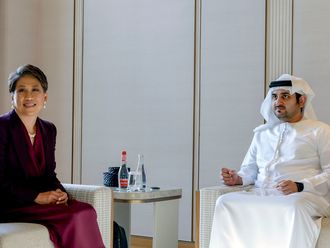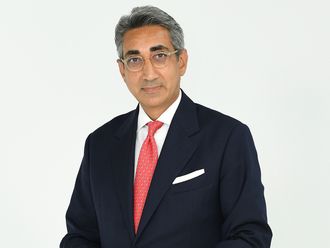Dubai: Saudi Arabia and its ambitious reform plans are the focus of all the hype in Middle Eastern financial circles these days, but it’s still in the UAE where banks are earning most of their money.
Investment banking fees paid to lenders in the UAE were 45 per cent higher than in the kingdom last year, according to New York-based research firm Freeman & Co. Saudi Arabia has trailed the UAE for fees earned from merger and acquisitions, equity capital market and financing deals since 2011, and is off to a slower start this year, according to the data.
Global banks are investing in Saudi Arabia in preparation for an expected fee bonanza. As part of efforts to repair state finances damaged by a slump in oil prices, the kingdom plans to create the world’s largest sovereign fund and sell hundreds of state assets, including Saudi Arabian Oil Co. The IPO could value the company at $2 trillion (Dh7.34 trillion) and generate millions of dollars in fees, but banks may have to wait before their investments pay off.
“There will be fees from Saudi Arabia, but it will take a while to get there,” Richard Segal, a London-based analyst at Manulife Asset Management said. “There is a lot of business to be done, it’s just that banks have to make upfront investments until the first deal.”
Citigroup talks
Citigroup Inc is in advanced discussions for a banking license after a more than 10-year absence from the kingdom, people familiar with the matter said this month. Chief Executive Officer Mike Corbat met the kingdom’s Prince Al Waleed Bin Talal Al Saud — a key Citigroup shareholder — for talks in Riyadh this week.
US President Donald Trump also met Deputy Crown Prince Mohammad Bin Salman, who is spearheading Saudi Arabia’s plans to transform its economy and reduce its reliance on oil, earlier this week in Washington, D. They discussed Saudi investments in the US and providing American companies with the opportunities to enter the Saudi market, a senior adviser to the prince said in a statement after Tuesday’s meeting.
Credit Suisse Group AG has allocated about $600 million of its own capital to expand its business in the kingdom and is seeking an onshore license, while Evercore Partners Inc, which is said to have won a role to advise on Aramco’s IPO, plans to open an office in Dubai, people said.
International banks already present in the kingdom are adding staff, dispatching top executives to Riyadh and promoting Saudis to senior roles to secure deals. Among the biggest, HSBC Holdings Plc and JPMorgan Chase & Co. appear to have a head start.
Saudi deals
HSBC was the top arranger for bonds and loans in the kingdom last year, according to data compiled by Bloomberg. The bank’s profit in Saudi Arabia last year rose to 279 million riyals ($74.4 million), up from 229 million riyals a year earlier. The London-based lender is said to be among banks hired by Saudi Arabia to help arrange its international Islamic bond sale.
JPMorgan planned to increase its Saudi staff of 65 by about 10 per cent, Bader Al Amoudi, who runs its local operations, said in an interview last year. The US bank almost doubled its profit for 2015 to 32.8 million riyals. Deutsche Bank AG has about 80 people in Saudi Arabia.
Banks earned $237 million in investment banking fees in the UAE last year, compared with $164 million in Saudi Arabia, the Freeman data shows. Lenders secured $154 million from financing deals in the Emirates, compared with $121 million in Saudi Arabia, even after the kingdom raised $17.5 billion in the largest-ever emerging-market debt sale. M&A fees in the UAE were $70 million, almost triple the $24 million earned in Saudi Arabia.
“The UAE was much more proactive with its restructuring and consolidation efforts,” said Khalid Howladar, founder of risk and ratings advisory firm Acreditus. Fees from Saudi Arabia “will inevitably come in 2017 and particularly 2018 as a consequence of the National Transformation Plan, Aramco and associated financial activity in all sectors.”
Abu Dhabi is merging two of its biggest banks, First Gulf Bank PJSC and National Bank of Abu Dhabi PJSC, as well as sovereign wealth funds Mubadala Development Co. PJSC and International Petroleum Investment Co. The emirate is also considering a plan to merge Abu Dhabi Commercial Bank PJSC and Union National Bank PJSC, and combine Abu Dhabi Islamic Bank PJSC with Al Hilal Bank PJSC, people with knowledge of the matter said in November.
Low-fee culture
With the Aramco IPO slated for the second half of 2018, banks still have some time before they’re able to reap any financial rewards. And even when payday comes, they’ll still face the challenge of the kingdom’s low-fee culture.
Banks and advisers working on Saudi Arabia’s $6 billion National Commercial Bank IPO, the world’s second-largest IPO in 2014 after Alibaba Group Holding Ltd, received about $6.7 million in fees, or about 0.1 per cent of the offering’s value. By comparison, Credit Suisse and Morgan Stanley took about 1.2 per cent of proceeds on the Alibaba sale.
“The Aramco IPO is likely to have fees hugely squeezed,” said Emad Mostaque, chief investment officer of emerging market hedge fund Capricorn Fund Managers. “Moelis have likely been engaged on their behalf to negotiate down fees to as low as possible as it doesn’t make sense for the fees to scale linearly in this case.”
Still, a successful offering could prompt more deals in the kingdom and rebalance the region’s investment banking fee pool.
“An upgrade announcement to the MSCI Emerging Markets for Saudi Arabia combined with a positive Aramco IPO would lead to a deluge of deals in Saudi Arabia at an order of magnitude above what one can expect to see in the UAE,” said Mostaque.












